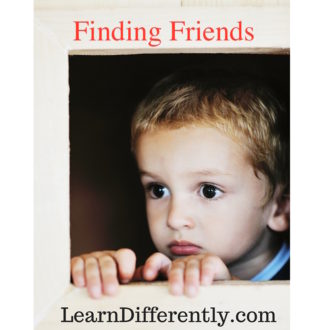Being friends to children with challenges

by Kathy Kuhl
How do we help our kids with special needs find and keep friends? One child’s story is attracting attention lately and can give us an opportunity.
Bob Cornelius has a sixth grader with autism, a boy named Christopher, who attends public school. On a bulletin board in his son’s special needs classroom, Bob saw the kids had each filled out a page about themselves: favorite song, favorite sport, and so on. Bob took a quick look, and snapped a photo.

When he got home, he read it more carefully. Then he saw his son’s answer to the sentence: “Some of my friends are…”

“No one,” Christopher replied.
“Never have 5 letters cut so deep,” his father wrote in a Facebook post that has been shared around the world, across the web, and on television and radio. (The link is below.) Bob urged parents to talk to their children about how to relate to kids who look and act differently.
Thousands of people have sent cards and letters to Christopher. That’s a wonderful outpouring of kindness. But what about the thousands of other kids whose names and stories haven’t gone viral? The one in your house, or down your street?
I hope more parents are having the conversation Bob asked for. What do you wish your friends in homeschool group and your neighbors would tell their kids about your child? What would you like them to say about how to get along with kids who learn differently or have special needs? The details vary because our kids have such different challenges, some visible and other invisible. I’d love to hear your comments. Let’s start with ideas that apply to most students with disabilities.
What kids need to know to be better friends to kids with learning challenges and special needs
- Everybody has feelings.
- Everyone has interests. Someone very different from you might share yours: music, movies, drawing, favorite sports teams. Ask.
- Everyone wants respect. (As a Christian, I think everyone is made in the image of God, and deserves respect. If you share that belief, that’s an excellent foundation to begin this conversation with your child.)
- When you make fun of people, look down on them, or ignore them, they notice more than you think they do.
- There’s a reason kids, teens, and adults with learning challenges and special needs act differently. They aren’t trying to be weird.
- Everyone has things that are hard for them. Even you.
- Everyone has talents. Get to know that student with challenges: you might find a new friend.
To be better friends, understand the other student’s difficulties
I realize there are far too many different challenges for me to give examples for all in one post. Please add your favorites in the comments section below, which I moderate. Here are a few to begin with:
To understand many learning challenges, visit Understood.org. (All links are below.) See the “Through Your Child’s Eyes” feature, which lets you watch simulations of what different disabilities feel like.
To understand dyslexia, dysgraphia, and more learning disabilities, see DyslexicAdvantage.com. I like the videos halfway down that home page, especially “Because I’m Dyslexic,” and also their Youtube channel.
To understand autism, below is a good video from Just Like You, which has also produced shorter videos on being friends with kids with Down Syndrome, and kids with cancer. I just subscribed to the Just Like You Youtube channel.
Please also see the resources in my post on what to tell teachers and leaders who work with your child.
Help your friends
What would you tell parents of kids who don’t share your child’s special need? Next time we’ll consider how those parents can best help you. Please enter your ideas on either question in the comments section below. Thank you.
Resources to share with friends to help their kids understand
Bob Cornelius’ original Facebook post is here.
Dyslexic Advantage has great videos, especially “Because I’m Dyslexic,” halfway down this page. (I’m resisting the urge to embed this video because I want you to see their website, online community, and other resources. This website features BrowseAloud, which will read the page to you. Perfect for dyslexics! It’s so easy to forget how much work reading is for some people.
Just Like You – good video on autism for non-autistic kids. Just Like You also has made videos on befriending kids with other kinds of challenges.
My post on what to tell co-op teachers and other leaders who work with your child.

